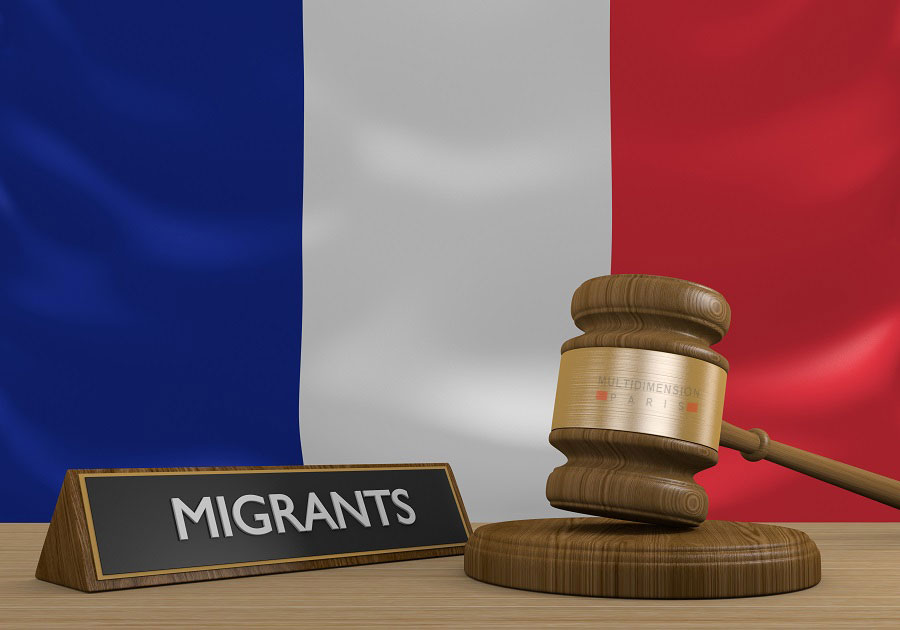Multidimension desk:
Proposed changes in the treatment of asylum demand
The bill provides for the creation of “Espaces France Asile”, to offer asylum seekers a simplified administrative path between the various competent administrations, namely the prefecture, the French Office for Immigration and Integration (OFII), the French Office for the Protection of Refugees and Stateless Persons (OFPRA). The government plans to deploy this system gradually, according to local needs and capacities, in order to rebalance the reception of asylum seekers in the territory.
The bill also proposes reforms to the organisation of the asylum appeal procedure before the National Court for the Right of Asylum (CNDA), in order to speed up the processing of appeals against refusals of protection by the OFPRA. The creation of the territorial chambers of the CNDA (which is today a single institution located at Montreuil) and hearing by a single judge are planned. The existing system of collegial court with three (3) persons will only be constituted if the complexity of a case justifies it.
Simplify appeal procedure against administrative decisions by the foreigners
Finally, the bill aims to simplify the procedure for cases involving the effective right of foreigners to challenge administrative decisions, most of which are “obligation to leave French territory” (OQTF). This type of case is about 40% of the work of the Administrative Court (Tribunal Administratif). Already, the use of video hearings to adjudicate claims of foreigners held in administrative detention or in waiting areas has been increased to speed up the decision making process.
Un résumé du projet de loi sur l’immigration 2023: 2ème partie
Les changements proposés dans la procédure d’asile
Le projet de loi prévoit la création des “espaces France Asile”, pour offrir aux demandeurs d’asile un parcours administratif simplifié entre les différentes administrations compétentes, à savoir la préfecture, l’Office français de l’immigration et de l’intégration (OFII), l’Office français de protection des réfugiés et apatrides (OFPRA ). Le gouvernement envisage de déployer ce dispositif progressivement, en fonction des besoins et des capacités locales, afin de rééquilibrer l’accueil des demandeurs d’asile sur le territoire.
Le texte propose également des réformes de l’organisation de la procédure de recours en matière d’asile devant la Cour nationale du droit d’asile (CNDA), afin d’accélérer le traitement des recours contre les refus de protection par l’OFPRA. La création des chambres territoriales de la CNDA (qui est aujourd’hui une institution unique située à Montreuil en Seine-Saint-Denis) et la généralisation du juge unique sont prévues. La cour collégiale ne sera constituée que si la complexité de l’affaire le justifie.
Simplifier le contentieux des étrangers
Enfin, le projet de loi vise à simplifier la procédure pour les affaires concernant le droit effectif des étrangers à contester les décisions administratives, dont la plupart sont des “obligations de quitter le territoire français” (OQTF). Ce type d’affaires représente environ 40% de l’activité du Tribunal Administratif. D’ores et déjà, le recours à la vidéo-audience pour statuer sur les demandes des étrangers maintenus en rétention administrative ou en zone d’attente est accru afin d’accélérer le processus de décision.
Adaptation: Projet de loi pour contrôler l’immigration, améliorer l’intégration/ Publié le 2 février 2023
تلخيص مشروع قانون الهجرة 2023: الجزء الثاني
ما هي التغييرات المقترحة في عملية اللجوء و الدعاوي
يفترض مشروع القانون خلق ” فضاء فرنسا لجوء” لمنح تسهيلات إدارية لطالبي اللجوء بين مختلف المصالح الإدارية، ولاية الأمن، المكتب الفرنسي للهجرة و للادماج، المكتب الفرنسي لحماية اللاجئين و المستغربين.
OFII, OFPRA
ستقوم الحكومة بتطبيق هذه العملية تدريجيا، أخذا بعين الاعتبار الاحتياجات و القدرات المحليه من أجل خلق توازن عملية اللجوء بين مختلف المناطق.
يقترح كذلك النص تعديل عملية الطعن بالنسبة للجوء أمام المحكمة الوطنية لحقوق اللاجئين
CNDA
من أجل تسريع دراسة الملفات أمام رفض الحماية من طرف OFPRA .
خلق مكاتب محلية CNDA
(حاليا هي إدارة وحيدة متواجدة بمدينة مونتروي، سين سان دوني)
النظام الحالي” للمحكمة الجماعية” المكونة من ثلاث أشخاص، لن يتم اللجوء إليها الا في الحالات
المعقدة.تبسيط إدارة النازعات التي يشترك فيها الأجانب
اخيرا، مشروع القانون يهدف إلى تبسيط المسطرة المتعلقه بالحق الفعلي للاجانب في الاعتراض على القرارات الإدارية، في أغلب الحالات، تكون متعلقه باجبارية مغادرة التراب الفرنسي OQTF
هذا النوع من القضايا يمثل حوالي 40% من نشاط المحكمة الإدارية. يعتمد اللجوء إلى تقنية الفيديو في الجلسات لاتخاذ القرارات المتعلقه بطلبات الأجانب، الموجودين تحت الاحتجاز الإداري، أو في مناطق الانتظار من أجل تسريع اتخاذ القرارات.


Recent Comments